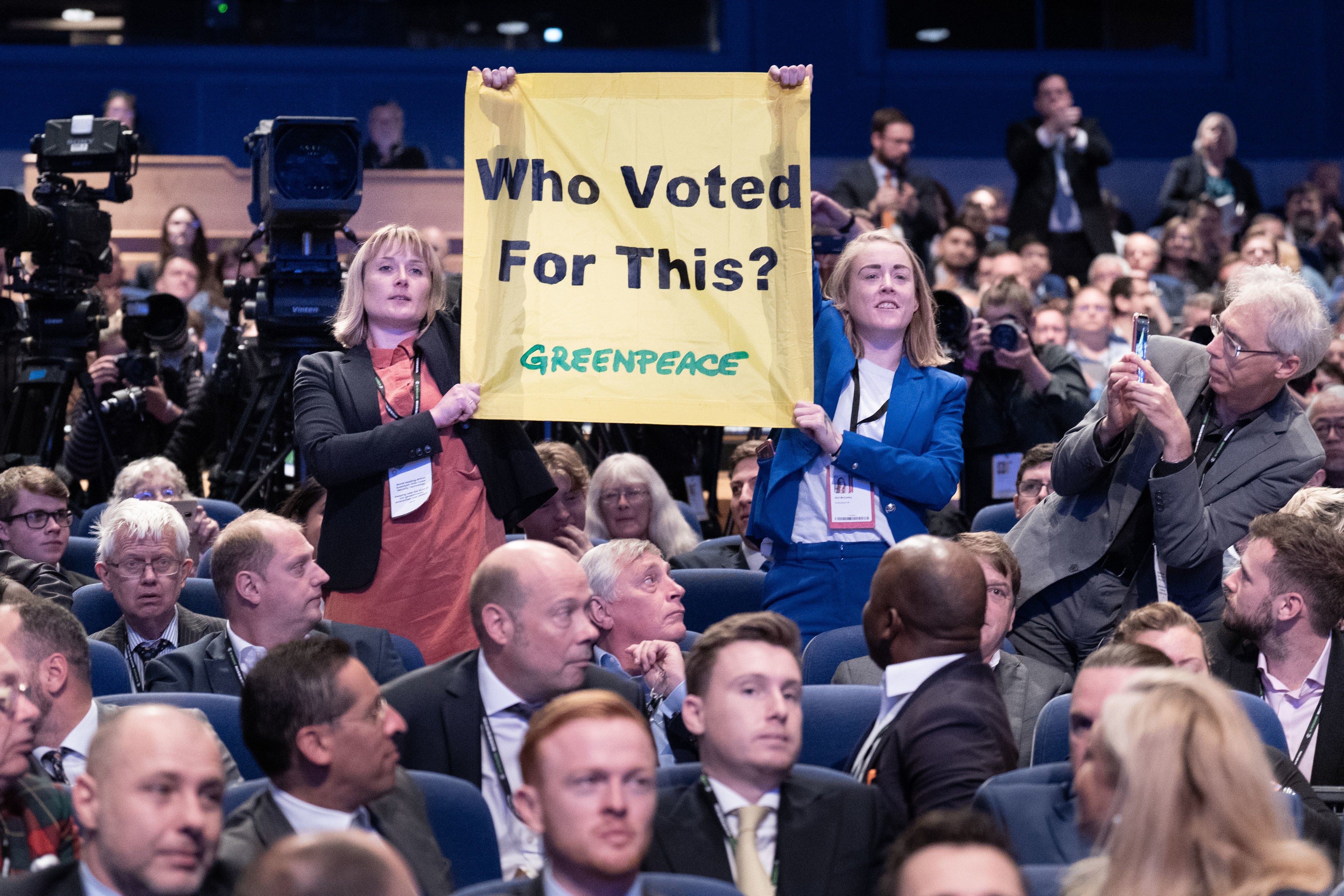Labour is going green, so why aren’t the Tories?
It might have once been the case that there are ‘no votes in eco’ but we’ve come a long way since then and the Conservatives still don’t seem to have realised it, writes Chris Blackhurst


The party conference season is over.
Apart from the obvious divergence regarding unity, and lack of it, between Labour and the Tories, there was another notable difference. In his leader’s speech, Sir Keir Starmer stressed repeatedly Labour’s commitment to green causes, to combating climate change. In hers, Liz Truss proclaimed “growth, growth, growth”.
Even when Sir Keir did reference his desire to boost the economy he still did so in the context of the environment, declaring that Britain would become a world leader in the manufacture of renewable energy equipment and technology, and the jobs that would create. Truss’s address was interrupted by demonstrators from Greenpeace, which allowed her to include them in the “anti-growth coalition” intent on holding the country back, a quip that earned her spontaneous applause.
Pro-green, anti-green, why the polarity and which is right and which is wrong? It’s long been the mantra at the top of the Conservative Party, among the hierarchy and their strategists that there are “no votes in eco”. It’s regarded as one for the Liberal Democrats and the Greens, and as the Tory mockers like to say, look at them.
Occasionally there have been dalliances –David Cameron with the huskies, Boris Johnson with his eco-campaigning wife and her friends – but by and large, the traditional Tory establishment does not go there, keeping its head down where the future of the planet is concerned, preferring to win electoral support on other issues. Of course, the Johnson administration lent its weight to COP 26 – it helped that the United Nations conference was in Britain – but among many in the party, where the rising temperature of the planet is concerned, the mood is decidedly lukewarm, if not openly sceptical. Certainly, there is little sense of climate change being at the top of Truss’s agenda.
For a period, Labour, too, did not exactly rush to embrace the cause. That has shifted markedly in the past few years and has moved up a gear again this year. Partly it can be explained by the mounting evidence in our lives and on our TV screens that is simply impossible to ignore and to easily dismiss. Britain has just endured a torrid summer of record temperatures, while around the world, forest fires, floods and droughts abound. All the signs are pointing one way.
But a clear majority of Britons (79 per cent) also say they are willing to pay at least something additional for the UK to achieve net zero by 2050
Partly as well, though, there is calculation in what the Tories dismiss as Labour’s madness. A poll of more than 1,000 British adults conducted by Dr Mike Turner of Australian consultancy Freshwater Strategy – he carried out polling for Jeremy Corbyn’s 2017 campaign, the Liberals in Australia, and most recently Truss’ successful leadership bid – shows that an overwhelming majority of British people (76 per cent) agree that the threat from climate change is real and could have a devastating impact. Just 8 per cent disagree.
It’s a view that extends across the divide, with a clear majority of supporters from all political parties agreeing - more than two-thirds of Leavers (68 per cent), 84 per cent of Remainers, almost three-quarters of Conservatives (71 per cent) and four-fifths of Labour supporters (82 per cent) and nine in ten Lib Dems (90 per cent).
However, a significant minority of voters maintain that economic growth should always be prioritised over the environment, suggesting that there is a price to obtaining Britain’s environmental and climate change goals. Prioritising the economy over the environment is strongest among Conservatives (46 per cent) and Leave supporters (43 per cent). Truss, then, is preaching to the converted.
But a clear majority of Britons (79 per cent) also say they are willing to pay at least something additional for the UK to achieve net zero by 2050. Turner reckons the average British adult is prepared to pay extra, up to £8.50 per week or almost £450 per year, to ensure that the UK achieves net zero carbon emissions by 2050. Given there are 53 million adults in the UK – that could make this a £23.5bn a year market.
So, we’re all pretty much agreed that a hotter Earth is hugely harmful. Some, mostly Tories and Brexiteers, put the economy ahead of climate change. But almost 80 per cent of all British adults would be prepared to pay for Britain to meet its net-zero target. Agreeing is one thing; opening your wallet to support it is quite another.
Sir Keir and his team are determined to be across eco, moving to make climate change their own. They’re being given a clear run: Truss is sticking, not budging, but in doing so she risks appealing only to her core followers. And elections, as we know, are won by “swing”, not loyal, voters determining the outcome in the marginal seats.
Labour is going green, in the knowledge their approach of resisting climate change and using it to drive economic growth is a popular strategy. Truss meanwhile is in danger of not listening when people say they care about the planet and they’re even prepared to pay to do something about it. Versus Truss, Sir Keir is positioning himself much closer to the zeitgeist and if you’re chasing a resounding electoral majority that has to be the better place to be.




Join our commenting forum
Join thought-provoking conversations, follow other Independent readers and see their replies
Comments